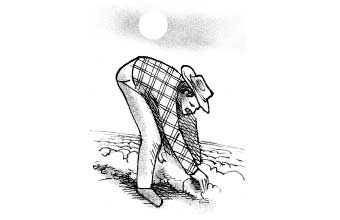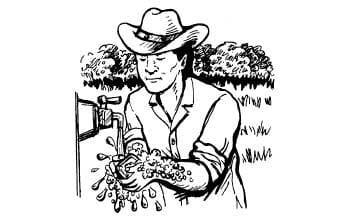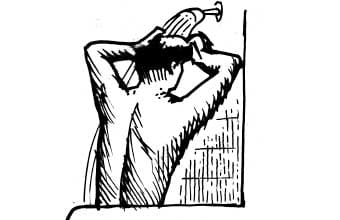Basic Field Sanitation Practices
Key points
- Following basic sanitation practices will help keep you healthy.
- It’s important to regularly wash your hands with soap and water.
- Be sure to use the toilet facilities we provide.
Agricultural work can be dirty
Most of us in agriculture and horticulture like working outdoors. We like the fresh air, the sunshine, and the wide open space. But agricultural work can be very dirty. Our hands are constantly in the dirt and soil, the wind may blow debris from some distance away, and many of us work in areas where pesticides have been applied. In addition, working around agricultural machinery such as tractors, combines, forklifts, or the moving parts of equipment inside a packing shed can result in grease, oil, and other substances getting on our faces and hands. Some plants also have “dust” on their foliage – if you get it on you, then rub your eyes, it will irritate and burn your eyes.

Agricultural work can be very dirty. Our hands are constantly in the dirt and soil.

Regularly wash your hands with soap and water. This will help keep you from getting sick, and from spreading germs to your co-workers.

Thoroughly shower and shampoo your hair at the end of the day if you’ve worked in a pesticide-treated area.
Keeping your hands clean
- Regularly wash your hands with soap and water. This will help keep you from getting sick, and from spreading germs to your co-workers.
- Regular hand washing is also important to prevent skin rashes, especially if you’re working in a greenhouse or in another hot, humid environment.
- We provide hand washing facilities for our employees. These include clean water, soap, and paper towels.
- We encourage you to use these facilities each time you take a break and before you go home at the end of the day.
- It’s very important to wash your hands before you eat, drink, chew gum, or smoke tobacco, and before and after you use the toilet.
Our toilet facilities
- We provide portable toilets that you can walk to from your work site.
- We encourage you to use the toilet facilities we provide as frequently as you need to.
- Urinating in the field, on plants, or anywhere else other than in the facilities we provide is an unhealthy practice.
- After you are done using the toilet, be sure it is in clean condition. And remember to wash your hands.
Working in pesticide-treated areas
- Working in areas where pesticides or other chemicals have been applied requires even greater attention to good sanitation practices.
- It’s critical that you wear gloves and any other personal protective equipment we provide so pesticide residues do not get on your skin.
- Wearing a long-sleeved shirt, long pants, hat or cap, and shoes and socks will help protect your body from pesticide residues.
- If you work in areas where pesticides have been applied, be sure to wash your hands and your face before you eat, drink, chew gum, smoke, put on makeup, or use the toilet.
- At the end of each day, wash your whole body with soap and water, shampoo your hair, and change into clean clothes.
- Remember not to eat, smoke, or keep food exposed in an area where chemicals are being applied.
- Immediately tell a supervisor and thoroughly wash your skin with soap and clean water if pesticides are accidentally spilled or sprayed on your body.
Basic Field Sanitation Do’s and Don’ts
Do
- Regularly wash your hands with soap and water to prevent skin rashes and to prevent germs from spreading.
- Drink a sufficient amount of water, especially on hot days, so you don’t get sick.
- Use the toilet facilities we provide as frequently as necessary.
- Hesitate to tell your supervisor if you become dizzy or ill at work or develop a rash. You may need to see a doctor.
- Forget to wear gloves and other personal protective equipment to protect yourself from pesticide residues.
- Let your bare skin touch plants, the outside of protective clothing, or anything else that may have pesticide residues on it.
When you’re ready to work safely, you’re ready to work. See our full line of safety supplies, including respirators, eye and ear protection, coveralls, first aid and more.







